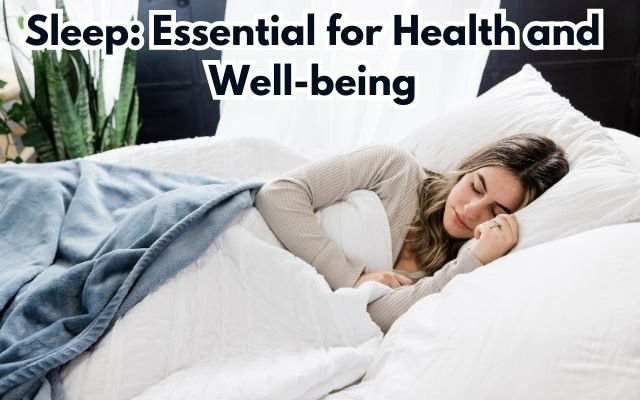The Science Behind Sleep: Why You Need It
Discover the science behind sleep and why it's essential for your brain, body, and overall health. Learn how sleep impacts your well-being.

Sleep takes up about one-quarter to one-third of a person’s life. But have you ever wondered what actually happens when you sleep?
Before the 1950s, many believed that sleep was a simple, passive activity where both the body and brain shut down. It’s clearly evident, though, that sleep is everything from passive. In actuality, the brain performs a variety of vital functions that sustain life & have an immediate effect on our quality of life when we sleep. Dr. Mark Wu, a sleep specialist at Johns Hopkins, says why sleep is essential for numerous brain processes that maintain our physical and mental well-being.
Dr. Wu and other researchers are committed to learning more about the science behind sleep. Researchers are always looking at the relationship between sleep & general health and wellbeing. Even though our understanding of sleep science has grown significantly, researchers are still trying to fully comprehend this fascinating topic and how it affects our bodies.
Table of Contents
Why Not All Sleep Is Equal: Importance of REM and Non-REM Sleep
Your brain goes through two primary stages of sleep: non-REM sleep & REM (rapid-eye movement) sleep. Each of these sleep patterns is vital to your general health and well-being, and they rotate throughout the night.
What is Non-REM Sleep?
There are four stages of non-REM sleep which makes up the first portion of your sleep cycle. Starting with the first step, which is the phase of transition from awake to sleepy, the journey begins. You might feel sleepy at this point and you can still wake up quickly.
In the second stage, light sleep takes place. Your body temperature drops during this time & your breathing and heart rate become more regular, making it simpler for you to sleep. During this phase, your body prepares for a deeper sleep cycle.
Deep sleep is referred to as third and fourth stages. This stage, which enables your body to mend and recover, is crucial for physical regeneration. Your body goes through significant processes including tissue growth and repair during these stages.
The Importance of Non-REM Sleep
For many years, researchers believed that REM sleep was the most critical phase for learning and memory. Recent research, however, indicates that non-REM sleep—particularly the deep stages of sleep—may be even more crucial for these processes. The calming and rejuvenating effects of non-REM sleep provide your body the boost it needs to perform at its best.
What Happens During REM Sleep?
You eventually reach REM sleep as your sleep cycle progresses. During this period, you’ll see quick eye movements beneath your closed lids. Your brain becomes more active during REM sleep & its waves resemble those of awake. Along with this quickening respiration, your body experiences a brief paralysis. It is said that this paralysis keeps you from realizing your dreams, which typically come true at this point.
The Sleep Cycle Repeats
After you finish a period of REM sleep, your body starts the cycle again. However, with each cycle, you spend less time in the deeper non-REM stages (three and four) and more time in REM sleep. You experience four to five full sleep cycles in a typical night which enables your body and brain to benefit from both REM and non-REM sleep.
Knowing the sleep cycle is crucial because it emphasizes how critical both forms of sleep are to preserving your physical & mental well-being. Prioritizing getting enough sleep can improve mood, cognitive function and overall wellbeing.
How Your Body Naturally Manages Sleep Patterns
Dr. Mark Wu, a sleep specialist, claims that circadian rhythms and sleep drive are the two primary mechanisms that regulate when and how we sleep. Together, these inbuilt systems maintain equilibrium of our sleep cycles, guaranteeing that we receive the necessary sleep.
Circadian Rhythms: The Body’s Internal Clock
Circadian rhythms are like a built-in clock in your brain that helps regulate your sleep-wake cycle. This internal clock is controlled by a part of the brain called the suprachiasmatic nucleus, which responds to external cues, especially light. Your brain tells your body to be awake and active during the day when it detects light. Melatonin is a hormone that helps you feel drowsy and ready for bed. It is released as the clock strikes a lower hour. Your body will maintain its natural rhythm of day & night thanks to this technique.
People who are completely blind may have difficulty sleeping because their brains can’t detect these light cues. Without this critical information, their internal clocks may become misaligned, making it hard for them to fall asleep or wake up at regular times.
Sleep Drive: Your Body’s Natural Need for Sleep
Sleep drive is the term for the second mechanism regulating sleep. Your desire for sleep grows during the day, much way hunger does when you go for extended periods of time without eating. Your body’s need for sleep gets stronger longer you stay awake. By the time night falls, you have a natural want to sleep since your sleep drive is so strong.
One key difference between sleep drive and hunger is that while you can choose not to eat when you’re hungry, you can’t always resist the need for sleep. Even under less than perfect circumstances, your body will find a method to make you sleep if you’re exhausted enough. For example- when you’re really tired, your body may experience “microsleep,” which is a tiny period of time during which you nod off even with your eyes open. This could be problematic because it can occur suddenly for example during a meeting or even while driving.
How Naps Affect Your Sleep Drive
Taking naps during the day can also affect your sleep drive. A short nap, usually 20 to 30 minutes, can refresh you without impacting your nighttime sleep. On the other hand, taking a longer-than-30-minute nap, particularly in the afternoon, can lower your sleep drive & make it more difficult to fall asleep at night. Because you partially met your body’s demand for sleep during your nap, your body won’t feel the same intense want to sleep.
Gaining an understanding of relationship between circadian rhythms & sleep drive will help you improve your sleep hygiene. You can get better sleep and feel more rested and productive during the day by adjusting your sleeping patterns to coincide with these natural cycles.
- 7 Common Myths About Black Holes Debunked
- Everything you know about space is wrong
- 11 Valuable Facts About Venus
- ISRO’s Ambitious Future: Chandrayaan-4, Gaganyaan, Shukrayaan
Why Sleep Is Essential for You: Essential Role of Sleep for Your Brain and Body
If you’ve ever felt mentally foggy after a poor night’s sleep, you’re already familiar with how much sleep affects your brain. Sleep plays a crucial role in helping your brain function properly. “Brain plasticity,” or brain’s capacity to adjust & react to new information & experiences is one of most significant ways it achieves this. Because it aids in brain’s processing & storage of knowledge acquired during the day getting enough sleep is critical for brain plasticity.
When you don’t get enough sleep, it becomes harder for your brain to organize and retain new information, making it difficult to remember things in the future.
In addition to helping with memory and learning, researchers believe that sleep may help the brain clean itself. While you’re asleep, your brain is thought to remove waste products that build up in your brain cells throughout the day. When you don’t sleep enough, this cleaning process may not work as efficiently, which could lead to issues over time.
However, sleep is essential for the proper operation of your complete body, not just your brain. Lack of sleep can negatively impact your general health. For instance: sleep deprivation might exacerbate symptoms of specific illnesses. Individuals who suffer from depression, seizures, high blood pressure or migraines frequently observe an increase in severity of their symptoms following a restless night. Lack of sleep also impairs your immune system which makes it simpler for you to become ill or contract illnesses.
Sleep has effect on your body’s calorie-burning process. Your body’s ability to regulate blood sugar might be compromised by even one sleepless night which may cause you to temporarily become prediabetic. This demonstrates the significance of sleep for maintaining good physical & mental health. Dr. Mark Wu sleep specialist, asserts that there is substantial correlation between general health and sleep, emphasizing the significance of getting enough sleep.



